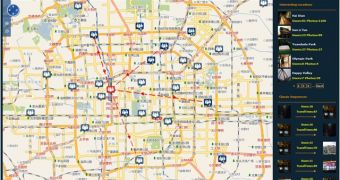GeoLife 2.0 is a project from Microsoft Research Asia designed to build a location based social-networking service. GeoLife, the brainchild of Microsoft Researcher Yu Zheng, was demonstrated at TechFest in Redmond this week, and you will be able to find a video embedded at the bottom of this article showcasing the service. GeoLife aims to put the information generated by GPS-enabled devices to good use, namely to power a social network that is built on top of Microsoft's Virtual Earth platform. The GPS-data-driven social network plans to deliver a new level of interactivity between users based on the location histories associated with their trajectories.
“It is not only a Website where individuals can manage, visualize, and understand their life experience using their own GPS trajectories; it’s also a social networking service that enables people to build connections with each other based on location histories,” explained Chris Pendleton, Virtual Earth tech evangelist, Microsoft. “Such real-world location histories imply, to some extent, users interests and intentions and enable us to understand people and locations.”
GeoLife 2.0 is not available to the general public. Microsoft has been testing the service for an entire year, with no less than 112 people willing to share their GPS trajectories on the social network. In the span of an entire year, from all participants, Microsoft has managed to harvest in excess of 7 million GPS points. Pendleton informed that the total distance recorded was over 170,000 kilometers. In the context in which the GPS-data is uploaded by the end users themselves, privacy concerns should not be an issue, as GeoLife members would share only the GPS trajectories that are of public interest, such as a tour of the most relevant landmarks in a foreign city.
“With multiple users GPS trajectories, GeoLife helps us not only understand an individual and a location, but also explore the similarity between users and the correlation among locations. By mining the similarity between people’s location histories, this system can help a user automatically discover potential friends in a community who might share similar interests. Thus, the user can conveniently deliver invitations to persons in the community and hence sponsor, with minimal effort, a social activity such as hiking, cycling, or traveling. From these potential friends past experiences, a trustworthy resource, the user is more likely to discover places that might match the user’s tastes,” Pendleton added.
TechFest: GeoLife 2.0
 14 DAY TRIAL //
14 DAY TRIAL //